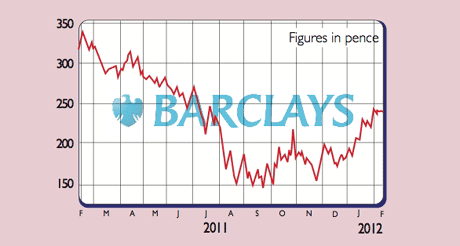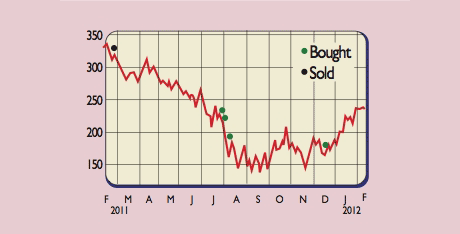Shares in focus: Don’t bank on Barclays
Barclays, like many other banks, faltered during the downturn. And with the world still paying down its debts, it's not about to get any better. So should you avoid Barclays? Phil Oakley investigates.
Get the latest financial news, insights and expert analysis from our award-winning MoneyWeek team, to help you understand what really matters when it comes to your finances.
You are now subscribed
Your newsletter sign-up was successful
Want to add more newsletters?

Twice daily
MoneyWeek
Get the latest financial news, insights and expert analysis from our award-winning MoneyWeek team, to help you understand what really matters when it comes to your finances.

Four times a week
Look After My Bills
Sign up to our free money-saving newsletter, filled with the latest news and expert advice to help you find the best tips and deals for managing your bills. Start saving today!
The business
Barclays is a global financial services company. Its core businesses include retail banking (bank accounts, loans and savings) in Britain, Europe and Africa; the Barclaycard credit card business; Barclays Capital Investment Bank; and a wealth management business for high net-worth individuals.
The history
The company can trace its roots back to 1690 when John Freame and Thomas Gould began trading as goldsmith bankers in London. Freame's son-in-law, James Barclay, became a partner in 1736. In 1896 a merger of 20 private banks created Barclay & Company, becoming Barclays Bank Limited in 1917. Barclays is famous for bringing us things we now take for granted. In 1966, it launched the Barclaycard, Britain's first credit card. The following year saw it introduce the first automatic cash machine.
Barclays' recent history is more colourful. In 2007, it had a lucky escape when it lost out to RBS in its bid to merge with ABN AMRO. But it picked up Lehman Brothers' North American investment banking business the following year. Like other banks, it needed extra cash to see it through the financial crisis.
MoneyWeek
Subscribe to MoneyWeek today and get your first six magazine issues absolutely FREE

Sign up to Money Morning
Don't miss the latest investment and personal finances news, market analysis, plus money-saving tips with our free twice-daily newsletter
Don't miss the latest investment and personal finances news, market analysis, plus money-saving tips with our free twice-daily newsletter
However, shareholders refused to back a £4.5bn rights issue and it had to rely on Asian sovereign wealth funds to raise the funds. Like its peers, Barclays made hay during the boom years by taking on lots of debt. It is finding life a lot harder in these more austere times.
The chief executive
Bob Diamond has been CEO since 2011. Once described by Peter Mandelson as "the unacceptable face of banking", Diamond has turned Barclays Capital into a major player in investment banking. He started out as an academic, but became a bond trader in the late 1970s. In 1996, he joined Barclays and set about growing its investment bank. He has earned millions as Barclays Capital has become a significant proportion of Barclays' total profits. He took home £6.7m in 2010.
Why you shouldn't own the shares
Put simply, Barclays isn't a very good business most banks aren't, as they earn poor returns for shareholders with large amounts of risk. Barclays' return on equity (ROE) in 2011 was a paltry 6.1%. If that wasn't bad enough, it needed huge amounts of borrowed money to achieve this.
For every £1 in equity, Barclays has £24 in assets similar to buying a house with a 95% mortgage. Banks like Barclays can only make an acceptable ROE by having lots of debt. This makes them risky investments in a weak economy. Barclays' return on assets in 2011 was a mere 0.26%.
The problem for Barclays and other banks is that the world is cutting debt, not taking on more. This means fewer loans, less credit-card debt, lower trading volumes and less corporate activity. The end result is lower income. Add in the fact that banks will have to hold more capital to make them less risky, and Barclays' 2011 ROE could become the norm.
Barclays Capital pays its staff too much (nearly half its income) while shareholders receive little for the risks they take. At 237p, Barclays may trade at just over half its book value of 456p, but its low returns mean the shares are not cheap. Avoid.
The numbers

Stockmarket code: BARC
Share price 237p
Market cap £28.9bn
Net assets (Dec 2011) £65.2bn
Assets/equity (Dec 2011) 24 times
P/e (current year estimate) 7.8 times
Yield (prospective) 3.0%
What the analysts say
Buy 17
Hold 14
Sell 2
Average price target 246p
Director Shareholding

Director and shares held
R Diamond: 13,197,895
C Lucas: 297,467
M Agius: 232,244
Get the latest financial news, insights and expert analysis from our award-winning MoneyWeek team, to help you understand what really matters when it comes to your finances.
Phil spent 13 years as an investment analyst for both stockbroking and fund management companies.
-
 Should you buy an active ETF?
Should you buy an active ETF?ETFs are often mischaracterised as passive products, but they can be a convenient way to add active management to your portfolio
-
 Power up your pension before 5 April – easy ways to save before the tax year end
Power up your pension before 5 April – easy ways to save before the tax year endWith the end of the tax year looming, pension savers currently have a window to review and maximise what’s going into their retirement funds – we look at how